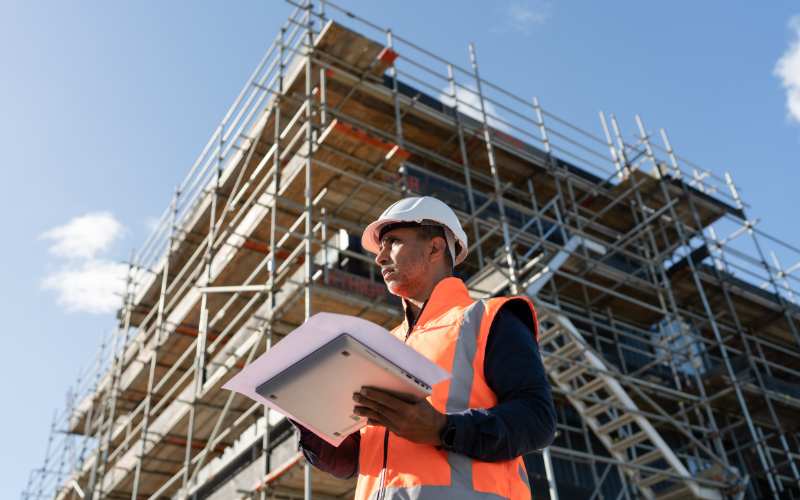Canada’s construction industry is rapidly expanding, providing excellent opportunities for immigrants seeking employment. Companies offer visa sponsorship to fill the demand for skilled labor, with positions available in Ontario, British Columbia, and Alberta.
Immigrants can benefit from visa programs like TFWP or PNP, securing work permits and permanent residency pathways. Canada offers competitive salaries, comprehensive benefits, and career advancement opportunities, making it a stable employment option.
Keep Reading!
Entry-Level Skills and Experience Required for Construction Worker Jobs in Canada
1. Basic Construction Knowledge
- Understanding the basics of construction processes, tools, and materials.
- Knowledge of safety protocols and regulations in a construction environment.
2. Physical Fitness
- The ability to perform physically demanding tasks, including lifting heavy materials, standing for long periods, and working in various weather conditions.
3. Teamwork and Communication Skills
- Effective collaboration with other team members, supervisors, and engineers.
- Basic English language skills to understand instructions and safety guidelines.
4. Attention to Detail
- The ability to follow construction plans and blueprints accurately.
- Ensuring precision in measurements, cutting, and material handling.
5. Problem-Solving Ability
- Quick thinking to resolve minor construction-related challenges on-site.
- Adaptability to unforeseen changes in work conditions or requirements.
6. Workplace Safety Experience
- Experience or certification in workplace safety practices, such as WHMIS (Workplace Hazardous Materials Information System) or basic first-aid training.
7. Experience with Construction Tools
- Familiarity with common construction tools like drills, saws, hammers, and measuring equipment.
- Basic carpentry, masonry, or concrete skills can be an asset.
8. Previous Construction or Labor Experience (Preferred)
- Some experience in manual labor, such as landscaping, manufacturing, or any form of physical labor, is often preferred.
Construction Worker Salary Expectations for Immigrants In Canada
Below is a table showcasing the salary expectations for construction workers in different regions of Canada. Salaries may vary depending on the location, experience level, and specific role within the construction field.
| Region | Average Annual Salary (CAD) | Hourly Wage (CAD) |
|---|---|---|
| Ontario | $40,000 – $60,000 | $20 – $30 |
| British Columbia | $45,000 – $65,000 | $22 – $32 |
| Alberta | $50,000 – $70,000 | $24 – $35 |
| Quebec | $35,000 – $55,000 | $18 – $28 |
| Saskatchewan | $40,000 – $58,000 | $20 – $29 |
| Manitoba | $38,000 – $57,000 | $19 – $28 |
| Nova Scotia | $35,000 – $50,000 | $18 – $25 |
Salaries for construction workers in Canada typically range from $35,000 to $70,000 annually, depending on the region and experience level.
Alberta offers some of the highest wages, followed by British Columbia, while provinces like Nova Scotia and Quebec offer lower average salaries. Hourly wages vary between $18 and $35, with higher pay found in areas where demand for skilled labor is higher.
Companies Hiring Construction Workers in Canada (with Requirements for Immigrants)
- EllisDon Corporation
- Location: Ontario, Alberta, British Columbia
- Link: EllisDon Careers
- PCL Construction
- Location: Alberta, Saskatchewan, British Columbia
- Link: PCL Careers
- Ledcor Group
- Location: Across Canada (Ontario, Alberta, British Columbia)
- Link: Ledcor Careers
- Aecon Group Inc.
- Location: Ontario, Quebec
- Link: Aecon Careers
- Bird Construction
- Location: Alberta, Ontario, British Columbia
- Link: Bird Construction Careers
- Graham Construction
- Location: Alberta, British Columbia, Ontario
- Link: Graham Construction Careers
- Borea Construction
- Location: Ontario, Quebec
- Link: Borea Construction Careers
Key Requirements for Immigrants:
- Valid Canadian work permit or eligibility for visa sponsorship (usually via Temporary Foreign Worker Program or Provincial Nominee Program)
- WHMIS (Workplace Hazardous Materials Information System) certification is often preferred
- Basic English proficiency for communication on-site
- General physical fitness and adaptability to labor-intensive work
How to Apply for Construction Worker Jobs as an Immigrant in Canada
1. Research Job Opportunities
- Begin by exploring reputable job search platforms and company websites that list available construction worker positions in Canada. Some of the most common platforms are:
- Job Bank Canada (Canada’s official job site)
- Indeed Canada
- Glassdoor
- Workopolis
2. Prepare Your Resume
- Tailor your resume to meet Canadian standards. Focus on including relevant construction experience, skills, and certifications. Highlight your physical capabilities and knowledge of safety protocols, which are key for construction jobs.
- Include your contact details and make sure to note your eligibility for a work visa or willingness to relocate to Canada.
3. Meet Eligibility Requirements
- You will need to meet certain eligibility requirements, including:
- Work Permit: Make sure you are eligible to apply for a Canadian work permit. You can check the eligibility criteria for work permits on the Government of Canada’s Immigration website.
- Educational and Language Requirements: Basic language proficiency in English or French is often required for communication on the job site.
- WHMIS Certification: If not already certified, consider obtaining a Workplace Hazardous Materials Information System (WHMIS) certification, as it’s often preferred in construction jobs.
4. Apply for Jobs
- Apply directly on company websites or through job portals like Job Bank Canada, Indeed, and Glassdoor. In your application, make sure to emphasize your experience, skills, and visa eligibility.
5. Explore Visa Sponsorship Programs
- Many construction worker jobs in Canada fall under the Temporary Foreign Worker Program (TFWP) or Provincial Nominee Program (PNP). Employers often sponsor foreign workers through these programs if they can’t find local talent.
- Check for jobs that explicitly mention visa sponsorship or indicate that the employer is open to hiring foreign workers.
6. Secure a Job Offer
- Once you’ve successfully applied and passed interviews, an employer may issue you a Job Offer. This offer is critical for obtaining a work permit.
- Ensure that your employer provides a Labour Market Impact Assessment (LMIA), which is required to show that there’s a need for foreign workers in that role.
7. Apply for a Work Permit
- Once you have a valid job offer and LMIA, apply for a work permit through the Temporary Foreign Worker Program (TFWP) or other immigration programs like the Provincial Nominee Program (PNP).
- Complete the application online or through a visa office and submit the required documents, including:
- Job offer letter
- LMIA
- Passport
- Medical exam and police certificates (if required)
8. Prepare for Relocation
- Once your work permit is approved, plan your relocation to Canada. Make sure you are ready for the construction job’s physical demands and Canadian workplace safety standards.
Visa Requirements for Employment for Construction Worker Jobs in Canada with Visa Sponsorship
1. Job Offer from a Canadian Employer
- The first step in obtaining a work visa is to secure a valid job offer from a Canadian employer. The job offer must be for a full-time position, and the employer must be willing to sponsor your visa application.
2. Labour Market Impact Assessment (LMIA)
- In most cases, your employer must obtain a Labour Market Impact Assessment (LMIA). This document proves that there is a need for a foreign worker to fill the position, and no Canadian worker is available.
- Some positions may be exempt from an LMIA, depending on the visa program.
3. Temporary Work Permit
- After receiving a job offer and a positive LMIA, you can apply for a Temporary Work Permit. The Temporary Foreign Worker Program (TFWP) allows employers to hire foreign workers for temporary roles. Construction jobs usually fall under this category.
4. Eligibility Criteria
- Proof of Job Offer: You must provide documentation of your job offer and LMIA.
- Valid Passport: Your passport should be valid for the duration of your intended stay in Canada.
- Language Proficiency: While not always mandatory, proficiency in either English or French is usually beneficial, particularly for understanding workplace safety rules and communicating on the job.
- Educational and Work Experience Documents: Provide proof of your qualifications, certifications, and work experience relevant to the construction industry.
- Medical Exam: Depending on the job and the country you are coming from, you may need to undergo a medical examination to ensure you meet the health standards required for working in Canada.
5. Visa Programs for Construction Workers
- Temporary Foreign Worker Program (TFWP): This is the most common pathway for construction workers, where the employer sponsors the worker for a temporary work permit.
- Provincial Nominee Program (PNP): Some provinces have programs that allow construction workers to apply for permanent residency if they meet the province’s specific labor needs.
- Atlantic Immigration Program (AIP): Some provinces in Atlantic Canada may offer immigration pathways for workers in the construction industry, with certain exemptions from LMIA requirements.
6. Police Clearance Certificate
- You may be required to submit a Police Clearance Certificate from your home country or any country where you have lived for more than six months as an adult.
7. Proof of Financial Support
- You may need to show proof that you can financially support yourself during your stay in Canada, especially if the employer is not covering initial expenses like accommodation.
8. Biometrics and Application Fees
- You will need to provide biometric data (fingerprints and photos) as part of the visa application process. There is also an application fee for the work permit, which you will need to pay when submitting your application.
9. Work Permit Duration
- A Temporary Work Permit is typically issued for the duration of the job offer, which can range from several months to a few years. You may be able to renew it or transition to permanent residency through programs like the Provincial Nominee Program.
Conclusion
Canada’s construction sector is attracting skilled immigrants seeking visa sponsorship to secure stable, well-paying jobs. The Temporary Foreign Worker Program (TFWP) and Provincial Nominee Program (PNP) allow immigrants to gain work permits and potentially transition to permanent residency.
As the industry expands, employers are actively seeking qualified workers, making it an ideal time to explore Canada’s construction job opportunities.
Related:






